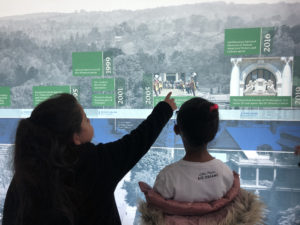
As a nonprofit with an education focus, there is rarely a bad time to ask: what is our responsibility to our community? One could also ask: what is our work, and how should we do it? But first, one must pose the question: why, and to whom does it matter?
The events of 2020 have created a good moment for the Historical Society of Washington, D.C. to reflect—and revisit such fundamental building blocks as its name, its mission, and vision. We have only just begun what will be a year-long process, but already we have a few items to share with you.
First, you may have already noticed that we have started “doing business as” the DC History Center. While the Historical Society of Washington, D.C. remains our legal name, we recognize that “society” can evoke exclusivity and privilege. With that in mind, we are now the DC History Center, where inclusivity and access are our guiding principles.
Simple and to the point, our mission statement will now be: the DC History Center deepens understanding of our city’s past to connect, empower, and inspire. This explains not only the substance of our work, but also the difference we wish to make in the lives of those we touch.
Our vision statement lays out our aspiration for the future: the DC History Center will reach into all eight Wards to preserve and elevate the stories of Washington’s diverse people, neighborhoods, and institutions. We will do this work as a welcoming and inclusive community that fosters curiosity and nurtures civic engagement to strengthen the District for all.
This vision clearly states that our goals are as important as how we get there.
We execute this work in four key program areas: research and scholarship, youth education, adult programs, and exhibits. And in everything we do, we embody the following values: stewardship, inclusion, civic engagement, integrity, authenticity, and connection.
Each of these building blocks has been informed by the urgent need to strengthen an organization that is diverse, equitable, accessible, and inclusive at all levels. We still have a long way to go and a lot of listening to do, but by fully integrating these principles in our strategic planning, we ensure that the DC History Center reflects the full diversity of the District, while rooted in a deeply felt ethic of service.
Because who we serve is you. Washingtonians of all stripes, whether at home in the District or further afield. Lovers of history, that of Frederick Douglass’s 19th century, as well as Frank Kameny’s 20th. Learners of all ages, in the classroom or curled up with a book. Neighbors, who claim DC as your very own—and voters, who demand enfranchisement. Fifth-generation Washingtonians, as well as first-generation Americans. This DC History Center belongs to you.
We would love to hear your feedback! Drop me a line at lhagood@dchistory.org and let us know what these changes evoke for you. What are your hopes and dreams for the DC History Center?
—Laura Brower Hagood is Executive Director of the DC History Center